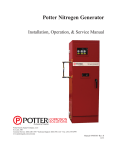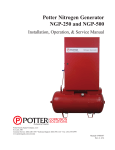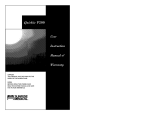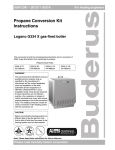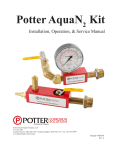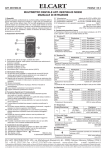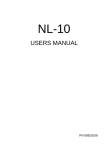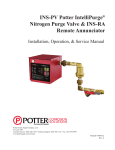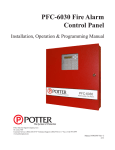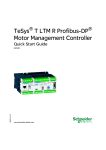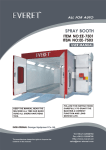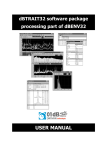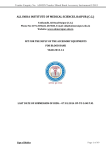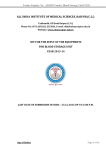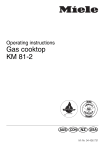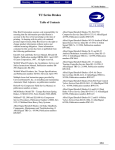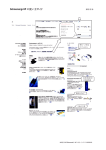Download Potter Nitrogen Generator - Complete Plumbing Source
Transcript
Potter Nitrogen Generator Installation, Operation, & Service Manual CORROSION SOLUTIONS Potter Electric Signal Company, LLC St. Louis, MO Customer Service: (866) 240-1870 • Technical Support: (866) 956-1211 • Fax: (314) 595-6999 www.pottersignal.com Manual #5403585–Rev. D 08/11 Potter nitrogen generator • 5403585 • REV D • 8/11 2 Potter nitrogen generator • 5403585 • REV D • 8/11 Table of Contents Safety................................................................................................................................................................................. 4 Safety Guidelines........................................................................................................................................................... 4 Important Notice to Users.............................................................................................................................................. 4 Unpacking...................................................................................................................................................................... 4 System Description........................................................................................................................................................... 6 Installation Instructions.................................................................................................................................................. 8 Initial Inspection (Arrival)............................................................................................................................................. 8 Receiving....................................................................................................................................................................... 8 Rigging & Moving......................................................................................................................................................... 8 Location & Installation.................................................................................................................................................. 8 Air Compressor Package (Except NGP-220).............................................................................................................. 8 Nitrogen Generator..................................................................................................................................................... 9 Nitrogen Storage Tank................................................................................................................................................. 9 Refrigerated Air Dryer (Separate, for NGP-3100 ONLY).......................................................................................... 9 NGP-SPV Self-Purging Valve Kit................................................................................................................................ 9 NGP-220...................................................................................................................................................................... 9 Installation .................................................................................................................................................................. 10 Wiring...........................................................................................................................................................................11 NGP-220 Wiring.........................................................................................................................................................11 Start-up and Operation................................................................................................................................................. 12 Start-up Procedure....................................................................................................................................................... 12 Filling Procedure.......................................................................................................................................................... 13 Filling Procedure 1: Air Filling Method................................................................................................................... 14 Normal Operation........................................................................................................................................................ 15 Maintenance................................................................................................................................................................... 16 Filter Replacement....................................................................................................................................................... 17 NGP-220 Filter Replacement.................................................................................................................................... 17 Automatic Drain Cleaning........................................................................................................................................... 17 Desiccant Dryer Maintenance...................................................................................................................................... 18 Nitrogen Analyzer Instructions..................................................................................................................................... 19 Automatic Calibration.................................................................................................................................................. 19 Calibrating the N2 Analyzer......................................................................................................................................... 19 Calibration Errors and Error Codes............................................................................................................................. 19 Changing the Batteries................................................................................................................................................. 20 Changing the Oxygen Sensor....................................................................................................................................... 20 Troubleshooting.............................................................................................................................................................. 22 Nitrogen Generator Parts Diagram.............................................................................................................................. 23 Technical Specifications and Drawings........................................................................................................................ 24 Technical Diagrams and Illustrations.......................................................................................................................... 25 Factory Settings.............................................................................................................................................................. 33 Maintenance and Purge Log......................................................................................................................................... 34 Warranty Policy............................................................................................................................................................. 35 3 Potter nitrogen generator • 5403585 • REV D • 8/11 Section 1 – Safety Safety Guidelines This manual contains safety information that is important to know and understand. This information is provided for for the safety of installers, operators, and users of the Potter Nitrogen Generator as well as equipment. To help recognize this information, observe the following symbols. D Danger indicates an imminently hazardous situation which, if not avoided, WILL result in death or serious injury. Warning indicates a potentially hazardous situation which, if not avoided COULD result in death or serious injury. Caution indicates a potentially hazardous situation which, if not avoided, MAY result in minor or moderate injury. Notice indicates important information, that if not followed may cause damage to equipment or property. Important Notice to Users The Installation and Owner’s Manual supplied with each unit must be read thoroughly and completely understood before installation and operation of the Potter Nitrogen Generator. All appropriate safety standards for handling of gases as determined by local or national laws and regulations should be followed at all times. Unpacking After unpacking unit, carefully inspect all parts and equipment for any damage that may have occurred during transit. Make sure to tighten fittings, bolts, etc., before putting unit into service. Do not operate unit if damaged occured during shipping, handling, or use. Contact Potter immediately. General Safety Information Important: Read all of the safety information in this manual before operating this equipment. Use of the equipment in a manner not specified within this manual may impair the protection provided by the generator and could result in an unplanned release of pressure, which may cause serious injury or damage. Only competent personnel, who have been trained, qualified, and approved by Potter Electric Signal Company should perform commissioning, servicing, and repair procedures. When handling, installing, or operating this equipment, personnel must employ safe engineering practices and observe all related local regulations, health, and safety procedures, and legal requirements for safety. Ensure that the equipment is depressurized and electrically isolated, before carrying out any of the scheduled maintenance instructions specified in this manual. The warnings in this manual cover the most known potential hazards, but by definition cannot be all-inclusive. If the user employs an operating procedure, item of equipment, or a method of working that is not specifically recommended by Potter Electric Signal Company, the user must ensure that the equipment will not be damaged or become hazardous to persons or property. 4 Potter nitrogen generator • 5403585 • REV D • 8/11 Nitrogen is not a poisonous gas. However, in a concentrated form, there is a risk of asphyxiation. The generator produces a flow of nitrogen and oxygen enriched air which quickly disperses in the atmosphere. However, do not directly inhale the output gas from the outlet pipe. The generator is classified as non-hazardous for transportation purposes and as non-flammable for fire regulations. This equipment is for indoor use only. Do not operate outdoors. Operation of the nitrogen membrane separator above the rated design pressure may be hazardous. Do not connect it to compressed air sources that can exceed its maximum rated pressure without installing appropriate pressure controls and safety relief devices in the compressed air supply line. Specific procedures must be developed for maintenance of the equipment on which the membrane separator is located. Appropriate labels must be continuously displayed in all areas where personnel might be exposed to a nitrogen atmosphere under normal or upset conditions. Do not attempt to disassemble the nitrogen membrane separator. Equipment damage may occur and cause the system to function incorrectly. 5 Potter nitrogen generator • 5403585 • REV D • 8/11 Section 2 – System Description The Potter Nitrogen Generator operates using membrane technology. The smaller oxygen and water vapor molecules can pass through (permeate) the membrane quickly. The larger nitrogen molecules are less likely to diffuse through the separator tubes; therefore, they continue downstream to the separator outlet. The permeate molecules are discharged to atmosphere through a vent in the separator casing. The Potter Nitrogen Generator is specifically designed to provide clean, dry, pure nitrogen for use in fire protection sprinkler systems. The generator is a fully assembled package ready to be connected to a new or existing fire sprinkler system using either a factory pre-engineered air compressor or an existing air source capable of providing the required air flow and air quality for the installation. These turn-key systems include all air filtration required to keep the generator operating at peak efficiency, and most models come standard with pressure gauges and a nitrogen purity analyzer (except NGP-220). Figure 1. Typical Complete System Diagram Figure 2. Typical N2 Generator Unit Diagram Nitrogen generation is affected by four (4) variables – Temperature, Flow Rate, Membrane Pressure, and Vent Pressure. 6 Potter nitrogen generator • 5403585 • REV D • 8/11 Figure 3. NGP-220 Unit Diagram PRESSURE GAUGE PG CHECK VALVE FLOW CONTROL VALVE BLOCKING VALVE METERING VALVE ANALYZER CONNECTION PRESSURE RELIEVING VALVE ANALYZER OIL LESS COMPRESSOR BLOCKING VALVE AFTER COOLER PS-2 PRESSURE SWITCH #6 COALESCING #6 FILTER COALESCING FILTER MANUAL DESICCANT DRYER BYPASS VALVE PRESSURE SWITCH ORIFICE CHECK VALVE PS-1 SAFETY RELIEF VALVE TO SYSTEM AMD-1 DWG. # 585-1 NITROGEN RECEIVER 7 Potter nitrogen generator • 5403585 • REV D • 8/11 Section 3 – Installation Instructions Initial Inspection (Arrival) Check all packages andcrates in shipment for damage. If damage is found, contact the carrier immediately and file a shipping damage claim with the carrier. Make sure that all ordered parts were received. If there are any missing parts, call the shipping carrier immediately. If there are any questions concerning the shipment, contact Potter Electric Signal at 800-325-3936. Receiving The compressor is inspected at the factory and packaged to protect against shipping damage. When the Potter Nitrogen Generator is unpacked, inspect for damage or missing parts. Contact the shipping carrier to settle all claims. Do not operate the Potter Nitrogen Generator if damaged during shipment, handling, or use. Damage may result in bursting and cause injury or property damage. Rigging & Moving Only move the supplied equipment with the correct material handling equipment. Always follow safety guidelines when moving the equipment. Make sure they are secured correctly before moving. Location & Installation There are up to 4 items to be installed with each Potter Nitrogen Generator system (depending on model). Determine the best location for each item and install each as shown on the system layout diagram. Figure 4. Typical System Layout AIR MAINTENANCE DEVICE REFRIGERATED DRYER TO R IS ER NITROGEN STORAGE TANK ELECTRICAL PANEL COMPRESSOR NITROGEN GENERATOR CABINET DWG. #0400-2 Air Compressor Package (Except NGP-220) Install the air compressor package on a level surface close to the nitrogen generator and nitrogen storage tank. The air compressor package includes a dryer. The exact location to the nitrogen generator and nitrogen storage tank isn’t critical; however, electrical power is required for the air compressor package and could be a factor in determining the ideal location. A dedicated 115 volt, 15 amp electrical circuit is required for the air dryer. The air compressor package should be permanently installed following the General Air Products air compressor manual (provided). 8 Potter nitrogen generator • 5403585 • REV D • 8/11 Do not install the AIR COMPRESSOR PACKAGE in an area where ammonia, sulfur dioxide, hydrogen sulfide, mercaptans, chlorides, chlorine, oxides of nitrogen, acid fumes, solvent vapors, and ozone vapors or similar contaminants exist. The equipment can be damaged by ammonia and other vapors, shortening membrane life. Locate the air compressor package to make sure no vapors are drawn into the intake. Avoid locations such as a loading dock, where large amounts of exhaust fumes and smoke may enter the air intake. Nitrogen Generator Install the Potter Nitrogen Generator in a clean, dry location, with ambient temperatures above 50° F at all times. The generator unit should be leveled and anchored to the floor or wall with appropriate fasteners. If the location is below freezing at any time the generator unit must be enclosed in a separate, heated enclosure to keep the temperature above 50° F. The nitrogen generator must be accessible at the front for servicing all major components inside the cabinet. Unless factory authorized, no more than five (5) riser systems are to be connected to a single Potter Nitrogen Generator . Exceeding the fill capacities can result in compressor run times that can shorten the compressor life. Nitrogen Storage Tank Bolt tank firmly to a level surface in a convenient location close to the fire sprinkler system connections. Support the piping to and from the tank independently. Refrigerated Air Dryer (Separate, for NGP-3100 ONLY) Install the refrigerated air dryer assembly on a level surface close to the air compressor assembly and nitrogen generator. The intake port of the air dryer should be below the exhaust port of the air compressor after-cooler. Do not over elevate the dryer. The distance between the air dryer and the air compressor isn’t critical; however, a dedicated 115 volt, 15 amp electrical circuit is required for the air dryer. The air dryer should be permanently installed to the floor using appropriate fasteners. NGP-SPV Self-Purging Valve Kit Install a purge valve assembly kit on each system in a tee prior to the inspector test valve to aid in removal of oxygen during the purge process. The purge valve maintains system pressure during the purge process and prevents a system trip due to pressure loss. The air vent in the NGP-SPV automatically closes if water reaches the vent in the event of a alarm condition. A plug is supplied to keep purge orifice free of debris when not in use. A ball valve allows isolation of assembly when not surging, to allow maintenance of strainer screen, replacement of air vent, or maintenance of purge orifice in the event it becomes clogged. NGP-220 The NGP-220 includes a nitrogen storage tank, oil-less air compressor. Nitrogen generator all mounted as one unit. Install the NGP-220 by bolting the tank firmly to a level surface in a convenient location close to the fire sprinkler system connections. Support the pipe to and from the tank independently. 9 Potter nitrogen generator • 5403585 • REV D • 8/11 Installation Use back-up wrenches when making connections or piping damage may occur. All piping connections must be independently supported and not impart stress on the components. 1. For models NGP-415, 750, 1150, 2500, and 2500H: install piping from the air compressor package air outlet to the nitrogen generator air inlet. For model NGP-3100: install piping from the air dryer outlet to the nitrogen generator air inlet. Use ½” NPT pipe or larger. If the compressor package was not ordered with the Potter Nitrogen Generator, connect the nitrogen generator inlet air connection to a source of compressed air. The air should be a minimum of 40° F pressure dew point, and should be free of liquid oil and water (see specification chart). For Model NGP-220: follow steps 5, 6, and 8 ONLY. 2. Install piping (½” minimum pipe) from the nitrogen generator outlet to the nitrogen storage tank 3. Install piping from refrigerated air dryer and nitrogen generator condensate outlet connections to an appropriate drain location. Follow local regulations when disposing of condensate. (Some local regulations may require an oil/water separator.) Pipe the discharged air and water to a position where the it will not be a hazard to personnel. 4. Install ¼” copper tubing (or equivalent) from the PS-2 pressure switch compression fitting located on the air compressor assembly to the nitrogen storage tank ¼” compression fitting. (Does not apply to NGP-220 & NGP-750 SOLO model.) 5. Install ½” NPT pipe (or larger) from the nitrogen storage tank outlet connection to the sprinkler system air maintenance device using standard accepted installation practices. Use ½” NPT pipe or larger. 6. Install ½” NPT pipe (or larger) from the air maintenance device to the sprinkler system using standard accepted installation practices. Additional system components may be required. 7. Install piping to membrane permeate outlet if required by local jurisdiction, due to inadequate ventilation. Adequate or outdoor ventilation, may be required by local jurisdiction. Figure 5. Typical System Layout REFRIGERATED DRYER TO RISER * AIR MAINTENANCE DEVICE DWG. #0400-3 NITROGEN GENERATOR CABINET NITROGEN STORAGE TANK ELECTRICAL PANEL 8. Install a NGP-SPV on each riser in a tee prior to the inspector test valve. The purge valve assembly requires a male ½ NPT connection at installed tee. After installation, close ball valve prior to initiating test or purging process. The ball valve should only be opened when purging the system. A ½” plug is installed in the orifice which requires removal during purge process. Plug should be installed in orifice when purging process is not being performed to keep orifice free of debris and buildup. 10 Potter nitrogen generator • 5403585 • REV D • 8/11 Figure 6. NGP-SPV Installation Diagram NGP-SPV 11" PIPE FROM SPRINKLER SYSTEM 7" PURGE ORIFICE (N2 SAMPLING PORT) 1/2" NPT F TEE CONNECTION AND CLOSE NIPPLE (SUPPLIED BY SPRINKLER CONTRACTOR) 7.3" PIPE PLUG (INSTALL AFTER PURGE COMPLETE) REMOVE PLUG WHEN SAMPLING N2 LEVELS UNION - POSITION VENT / ORIFCE APPROPRIATELY PURGE BALL VALVE SHOWN IN NORMAL (NON - PURGE) POSITION INSPECTOR'S TEST VALVE DWG. #0400-13 Wiring Refer to General Air Products air compressor manual and refrigerated air dryer manual for wiring instructions. An independent 115 volt, 15 amp circuit is required for the air dryer. Install electrical disconnect switches for both the compressor and the refrigerated air dryer. All wiring should conform to NEC and applicable local standards. NGP-220 Wiring Install electrical disconnect switch for the air compressor. The sole electrical connection is to the pressure switch mounted closest to the nitrogen cabinet door. This pressure switch is pre-wired to the second pressure switch mounted on the tank. All wiring should be performed by a licensed electrician and conform to NEC and all applicable local standards. Figure 7. NGP-220 Wiring Diagram LINE MOTOR LINE 5 LINE 7 LINE PS-2 MOTOR 6 M COMPRESSOR MOTOR PS-1 TANK PS-2 COMPRESSOR PIPING NEUTRAL MOTOR LINE MOTOR 8 PS-1 DWG. #585-2 GROUND 11 Potter nitrogen generator • 5403585 • REV D • 8/11 Section 4 – Start-up and Operation Start-up Procedure Before beginning start-up procedure, make sure the water supply is turned off. 1. Make sure all piping connections have been made according to installation instructions. Before powering up the Potter Nitrogen Generation compressor, check all piping connections for leaks: • Close all air maintenance device valves. • Fully open the generator bypass valve. • Fully close the nitrogen generator inlet and outlet valves. • Power the air compressor system ON and check all piping connections for leaks, refer to Figure 6. 2. Make sure the compressor has the proper amount of oil (except NGP-220. DO NOT oil the NGP-220). 3. Check that electrical connections to the air compressor and refrigerated air dryer (if applicable) have been made according to installation instructions. 4. Turn the refrigerated air dryer ON for at least 2 minutes before starting the compressor (if applicable). 5. If filling the system with air, follow Filling Procedure 1. If filling the system with nitrogen, follow Filling Procedure 2. 6. Turn the air compressor OFF and vent the entire nitrogen generator piping system by opening the nitrogen storage tank drain valve. 7. Close the nitrogen storage tank drain valve. 8. Fully open the generator inlet valve and outlet valve. 9. Close the bypass valve. 10. Power the air compressor system ON. 11. Monitor the inlet, membrane, and outlet pressure gauges. Refer to Figure 6. (Note: for the NGP-220 unit, monitor the membrane and outlet gauge only.) 12. The outlet pressure builds until it reaches compressor cut-off pressure and the compressor automatically turns off. When the outlet pressure falls below the cut-in pressure, the air compressors automatically turn on. Refer to Table 1 for Cut-in/ Cut-out pressures. Figure 8. Leak Check Valve Location Diagram CHECK FOR LEAKS AIR MAINTENANCE DEVICE REFRIGERATED DRYER CLOSE ALL VALVES OPEN GENERATOR BYPASS VALVE CHECK FOR LEAKS CLOSE NITROGEN INLET/OUTLET VALVES NITROGEN STORAGE TANK CHECK FOR LEAKS ELECTRICAL PANEL COMPRESSOR NITROGEN GENERATOR CABINET DWG. #0400-2 12 TO R IS ER Potter nitrogen generator • 5403585 • REV D • 8/11 The factory installed nitrogen purity analyzer can be monitored by pressing the power button. The nitrogen purity analyzer monitors the purity of the nitrogen in the nitrogen storage tank. The air compressor will have to cycle ON and OFF several times before the purity level in the tank stabilizes. Purging of the tank by cracking the drain valve open slightly may be necessary to make the air compressor cycle ON and OFF. When the tank nitrogen purity stabilizes to the desired level, the Potter Nitrogen Generator is operational and ready for the fire protection system to be filled. Table 1: Pressure Switch Factory Settings Model Compressor Cut – IN (PSIG) Compressor Cut – OUT (PSIG) NGP-220 80 100 NGP-200 90 110 NGP-415 90 110 NGP-750 90 110 NGP-750 SOLO 30 40 NGP-1150 90 110 NGP-2500 90 110 NGP-2500H 90 110 NGP-3100 90 110 Note: Actual settings may vary due to performance required Filling Procedure There are two different methods for filling the system initially: Air Filling Method and Nitrogen Filling Method. Use the proper filling method based on system commissioning requirements. If a test is performed on air supply capability, restore normal pressure within 30 minutes, per NFPA requirements. Refer to Table 7: Potter Nitrogen Generator Performance Specifications, for more information of using nitrogen or air. 13 Potter nitrogen generator • 5403585 • REV D • 8/11 Filling Procedure 1: Air Filling Method The “Air Fill” filling procedure for the Potter Nitrogen System (no pressure in sprinkler piping or nitrogen storage tank) can be used to test air supply capability to restore normal air pressure to the system within 30 minutes per NFPA requirements. 1. Start refrigerated air dryer (dryer should run 2 minutes before starting compressor). 2. Open the generator bypass valve. 3. Close the generator inlet and outlet valves. 4. Open all appropriate air maintenance device valves necessary to fill the sprinkler system. 5. Start air compressor. 6. Allow the sprinkler system to reach the desired pressure. 7. As soon as sprinkler system pressure is reached, put the sprinkler system back into service by placing the air maintenance device in maintenance position (refer to the air maintenance device manual for proper operation). Returning the Generator Back into Service or Supervisory Pressure Only Installations Note: It is recommended to use the nitrogen filling method to efficiently replace oxygen enriched air in the system with nitrogen. Refer to the nitrogen filling method procedure in this manual. To return the nitrogen generator to service: 1. Close the generator bypass valve. 2. Slowly open the generator inlet valve. 3. Slowly open generator outlet valve. 4. Open the Purge Ball Valve to place it in the purge position. 5. While the air compressor is running, monitor the nitrogen generator Inlet and Membrane pressures. Pressure readings should be similar. 6. The air compressor should automatically cycle OFF when the nitrogen storage tank pressure reaches the compressor cutout pressure. 7. After at least 10 air compressor cycles (ON / OFF), check the nitrogen purity at the nitrogen purity analyzer by pressing the ON button. To efficiently increase cycle times, relieve pressure in storage tank by opening and closing the storage tank vent. The purity level in the storage tank should be stabilized; however, it may be necessary to run the generator for more cycles to reach the factory set purity level. Turn off analyzer after use. 8. Periodically check the nitrogen purity level of the sprinkler system at the NGP-SPV purge valve assembly using a nitrogen analyzer or a portable oxygen analyzer. (Refer to Section 6 for nitrogen purity analyzer instructions.) 9. Continue purging using the installed purge valve assembly until acceptable nitrogen levels are reached to achieve maximum corrosion protection. Close the purge valve after desired nitrogen purity level is achieved. • The Potter Nitrogen Generator creates a 30% to 40% oxygen stream which may pose a flammability problem in an oxygen-sensitive environment. Pipe per installation requirements and ensure the area surrounding the Nitrogen Generator is adequately ventilated. • The Potter Nitrogen Generator should always be installed in an adequately ventilated room. Nitrogen is nontoxic and largely inert. Rapid release of nitrogen gas into an enclosed space displaces the oxygen and can cause an asphyxiation hazard. Inhalation of nitrogen in excessive concentrations can result in unconsciousness without any warning symptoms. 14 Potter nitrogen generator • 5403585 • REV D • 8/11 Filling Procedure 2: Nitrogen Filling Method The “Nitrogen Fill” Filling Procedure for the Potter Nitrogen System (no pressure in sprinkler piping or nitrogen storage tank). Make sure that water supply to the sprinkler system is off before starting this procedure. Note: This filling method is NOT recommended for the NGP-220. 1. Make sure water supply to the riser is off. 2. Make sure the NGP-SPV purge valve assembly is in the closed, non-purging position. 3. Open the Inspectors Test Valve On all risers in the system that are being commissioned. 4. Make sure that AMD valves on all riserse to the system are closed in order to isolate nitrogen generator tank. 5. Start the refrigerated air dryer. Run the refrigerated air dryer for 2 minutes before starting compressor. 6. Start the generator/compressor (if it is not already running). Make sure the nitrogen generator is not bypassed. 7. Wait for nitrogen storage tank to reach full pressure and compressor to shut off. 8. Slowly open bypass valves on the AMD for the riser(s) being commissioned, releasing nitrogen into the system. 9. Allow the nitrogen generator to run for 30 minutes with the Inspectors Test Valve open, pumping nitrogen into system and forcing air out. • The Potter Nitrogen Generator creates a 30% to 40% oxygen stream which may pose a flammability problem in an oxygen-sensitive environment. Pipe per installation requirements and ensure the area surrounding the Nitrogen Generator is adequately ventilated. • The Potter Nitrogen Generator should always be installed in an adequately ventilated room. Nitrogen is nontoxic and largely inert. Rapid release of nitrogen gas into an enclosed space displaces the oxygen and can cause an asphyxiation hazard. Inhalation of nitrogen in excessive concentrations can result in unconsciousness without any warning symptoms. 10. After 30 minutes of nitrogen flush, close the Inspectors Test Valve for the riser being commissioned. 11. Place AMD into maintenance position and allow riser to fully pressurize. 12. After riser has fully pressurized, restore water supply to riser. 13. Record time, date, and nitrogen concentration at Potter Nitrogen Generator. 14. Record riser location, time, date, and nitrogen concentration at the purge valve assembly. 15. Flush and pressurize, each additional riser, repeating steps 7-15. 16. Open the NGP-SPV purge valves(s). 17. In 2 weeks: • Measure and record time, date, and nitrogen concentration at Potter Nitrogen Generator. • Measure and record time, date, and nitrogen concentration at the purge valve assembly. 18. If nitrogen level is 95% or greater at purge valve, close purge valve to normal, non-purging, position. Normal Operation Nitrogen is generated by the Potter Nitrogen Generator from compressed air. The generator is controlled by pressure controls that monitor the nitrogen pressure and automatically starts and stops the air compressor based on the control settings. Occasional start and stop operation of the Potter Nitrogen Generator is normal. Frequent start and stop operation (more than 4 times per hour) is not normal operation indicating service is required. When the air compressor is not running, the Inlet and Membrane pressure gauges will read “0” when the air compressor is not running. Only the Outlet pressure gauge indicates pressure while the compressor is not running. When the air compressor is running, all three pressure gauges read pressure and typically show different pressure readings – this is normal. Note: For the NGP-220 model, only membrane and outlet pressure gauges are provided. 15 Potter nitrogen generator • 5403585 • REV D • 8/11 Section 5 – Maintenance All pressure must be relieved from the entire nitrogen generator system BEFORE servicing. To avoid system damage and/or personal injury, the nitrogen generator should be isolated from the compressed air supply and the generator system fully depressurized before any maintenance or service is performed. All maintenance and troubleshooting activities for the Potter Nitrogen Generator should be performed by qualified personnel using reasonable care. Before servicing, isolate all risers by closing all AMD valves and relieving all system pressure from the Potter Nitrogen Generator. Failure to do so could result in serious injury or death. The Potter Nitrogen Generator features durable components and construction for long-lasting value, reliable performance, and require little maintenance. The air filter and oil in the compressor require quarterly inspection/replacement. The filters in the generator enclosure, and batteries for Nitrogen Purity Analyzer require yearly replacement. Check the performance and operating conditions of the Potter Nitrogen Generator. This includes: • Verifying stable pressure readings on all pressure guages. • Confirming the filter differential pressure gauges read in the ‘green’ zone when the air compressor is running. • Confirming that operating pressure settings are correct. (Refer to Table 7.) The following table shows the scheduled maintenance required on the Potter Nitrogen Generator: Table 2: Scheduled Maitenance Table Part Frequency Filters Replace annually or as differential pressure indicates Compressor Oil (not applicable to the NGP-220) Replace quarterly Automatic Drains Clean annually or as required Nitrogen Purity Sensor Replace Battery and Sensor Element annually Desiccant & filters Replace annually Table 3: List of Service Parts Part Number 1119784 1119785 5130098 5330157 5330014 1119797 Description NGP-SPV: Nitrogen Self Purge Valve NGP-MK: Nitrogen Maintenance Kit (includes P/N's 5130098 & 5330157) Battery for NGP-Nitrogen Sensor (2 batteries) NGP-FLT: Nitrogen Filter Cartridges (1 each of #4 & #10 cartridges) Sensor Element for NGP NGP-DMK: Nitrogen Maintenance Kit with Desiccant (for the NGP-220 ONLY) The nitrogen membrane has an estimated 10 year service-free life, provided the quality of input air listed under the Technical Specifications section of this manual are always met. The hollow fiber membrane doesn’t require any maintenance. When the desired nitrogen purity cannot be obtained, the membrane should be replaced. 16 Potter nitrogen generator • 5403585 • REV D • 8/11 Filter Replacement To replace the filters in the generator cabinet: 1. Loosen and remove the copper tubing running from the bottom of the bowls to the automatic float drains. 2. Unscrew the bowl from the filter body. 3. Remove the element by unscrewing the retainer at the bottom of the filter. 4. Be sure that the 10C10-050 filter in on the inlet (left side) and the 4C10-050 is to the right. 5. Clean filter body and bowl with a clean rag. 6. Reinstall filters and bowls - be careful not to switch bowls or filters, and check for leaks. NGP-220 Filter Replacement 1. Unscrew the bowl from the filter body. 2. Remove the element by unscrewing the retainer at the bottom of the filter. 3. Replace filter elements with like sized elements from maintenance kit. 4. Clean filter body and bowl with a clean rag. 5. Reinstall filters and bowls - be careful not to switch bowls or filters, and check for leaks. Automatic Drain Cleaning 1. Remove the drain piping and clamp securing the automatic drains. 2. Remove and disassemble the drain. 3. Carefully clean the inside of the drain with a clean rag. 4. Reinstall drains. 5. Reinstall piping and pressure test the filters and piping for leaks. Figure 9. Drain Assembly Details 17 Potter nitrogen generator • 5403585 • REV D • 8/11 Desiccant Dryer Maintenance The only service required for silica gel units is when the desiccant color moisture indicator has changed from bright orange (meaning dry) to white (meaning wet). Should this color change occur: 1. Turn off and depressurize the line containing the dryer unit 2. Loosen the clamp ring and remove the bowl from the top housing. 3. Proceed to step 2 or 3 as desired Desiccant Replacement: 1. Pour out used desiccant. 2. Open new container and refill bowl. 3. Shake or tap bowl to settle desiccant. Fill bowl to 1/8” below inner step. 4. Dispose of desiccant according to local codes Desiccant Regeneration: 1. Pour out used white desiccant onto flat pan. Place desiccant in 350°F oven for approximately three hours or until the desiccant color has changed back to bright orange. 2. Remove desiccant from oven and allow it to cool to ambient temperature. 3. Pour desiccant back into unit bowl, periodically shaking and tapping to settle the desiccant. Replace bowl, bowl guard and clamp onto unit. Be sure clamp ring is securely locked in place before re-pressurizing the unit. Important Note: Please replace color change label (blue to pink) currently on your dryer assembly with the new color change label (orange to white) included with kit. 18 Potter nitrogen generator • 5403585 • REV D • 8/11 Section 6 – Nitrogen Analyzer Instructions Table 4: Nitrogen Analyzer Features Component Description 3 ½ Digit Display The 3 ½ digit liquid crystal display (LCD) provides direct readout of nitrogen concentrations in the range of 0 - 105.0% (100.1% - 105.0% used for calibration determination purposes). The digits also display error codes and calibration codes as necessary. Low Battery Indicator The low battery indicator is located at the top of the display and is only activated when the voltage on the batteries is below a normal operating level. % Symbol The “%” sign is located to the right of the concentration number and is present during normal operation. Calibration Symbol The calibration symbol is located at the bottom of the display and is timed to activate when a calibration is necessary. ON/OFF Key This key is used to turn the device on or off. Calibration Key This key is used to calibrate the device. Holding the key for more than three seconds will force the device to enter a calibration mode The device will assume a percent oxygen concentration when calibrating. Be sure to apply 100% oxygen, or ambient air concentration to the device during calibration or the device will not calibrate correctly. Automatic Calibration After the unit is turned on, it will automatically calibrate to room air. The display should be stable and reading 79.1%. To check the nitrogen concentration of a sample gas: (after the unit has been calibrated) 1. Connect the Tygon tubing to the bottom of the analyzer by threading the barbed adapter onto the oxygen sensor. 2. Attach the other end of the sample hose to the sample gas source and initiate flow of the sample to the unit at a rate of 1-10 liters per minute. 2 liters per minute is recommended. 3. Using the ON/OFF key, make sure the unit is in the power “ON” mode. 4. Allow the nitrogen reading to stabilize. This will take about 30 seconds or more. Calibrating the N2 Analyzer Calibrate the N2 analyzer upon initial power-up. Thereafter, Maxtec® recommends calibration on a weekly basis. To serve as a reminder, a one week timer is started with each new calibration. At the end of one week a reminder icon appears on the bottom of the LCD. Calibration is recommended if the user is unsure when the last calibration procedure was performed, or if the measurement value is in question. With compressed air (79.1% N2), new calibration is required when: • The measured N2 percentage in 79.1% N2 is above 80.1% N2 • The measured N2 percentage in 79.1% N2 is below 78.1% N2 • The CAL reminder icon is blinking at the bottom of the LCD A simple calibration may be made with the sensor open to static ambient air. Calibration Errors and Error Codes The nitrogen purity analyzer has a self test feature built into the software to detect faulty calibrations, oxygen sensor failures, and low operating voltage. Refer to the following table for an explanation of error codes and possible actions to take. 19 Potter nitrogen generator • 5403585 • REV D • 8/11 Table 5: Error Codes Code Meaning E02 No sensor attached E02 No valid calibration data available E02 Battery below minimum operating voltage CAL Err St: O2 Sensor reading not stable CAL Err lo Sensor voltage too low CAL Err hi Sensor voltage too high CAL Err Bat Battery voltage too low to recalibrate Corrective Action Open the hand held nitrogen purity analyzer and disconnect and reconnect sensor. Unit should perform an auto calibration and should read 79.1%. If not, contact Customer Service for possible sensor replacement. Make sure unit has reached thermal equilibrium. Press and hold the Calibration Button for three seconds to manually force a new calibration. Replace batteries. Wait for displayed nitrogen reading to stabilize, when calibrating the device at 100% oxygen. Wait for unit to reach thermal equilibrium (Please note that this can take up to one half hour, if the device is stored in temperatures outside the specified operating temperature range). Press and hold the Calibration Button for three seconds to manually force a new calibration. If unit repeats this error more than three times, contact Customer Service for possible sensor replacement. Press and hold the Calibration Button for three seconds to manually force a new calibration. If unit repeats this error more than three times, contact Customer Service for possible sensor replacement. Replace batteries. Changing the Batteries When the batteries need to be changed, the device will indicate this in one of two ways: » The battery icon on the bottom of the display will begin to flash. This icon will continue to flash until the batteries are changed. The unit will continue to function normally for approx. 200 hours. » If the device detects a very low battery level, an error code of “E04” will be present on the display, and the unit will not function until the batteries are changed. To change the batteries, begin by removing the three screws from the back of the device. A #1 phillips screwdriver is required to remove these screws. Once the screws are removed, gently separate the two halves of the device. The batteries can now be replaced from the back half of the case. Be sure to orient the new batteries as indicated in the embossed polarity on the back case. NOTE: If the batteries are installed incorrectly the batteries will not make contact and the device will not operate. Carefully, bring the two halves of the case together while positioning the wires so they are not pinched between the two case halves. The gasket separating the halves will be captured on the back case half. Reinsert the three screws and tighten until the screws are snug. (Figure 4) The device will automatically perform a calibration and begin displaying % of oxygen. HELPFUL HINT: If unit does not function, verify that the screws are tight to allow proper electrical connection. Changing the Oxygen Sensor Should the oxygen sensor require changing, the device will indicate this by presenting “Cal Err lo” on the display after initiating a calibration. To change the oxygen sensor, begin by removing the three screws from the back of the device. A #1 Phillips screwdriver is required to remove these screws. Once the screws are removed, gently separate the two halves of the device. Disconnect the oxygen sensor from the printed circuit board by pressing the unlock lever first and then pulliing the connector out of the receptacle. The oxygen sensor can now be replaced from the back half of the case. HELPFUL HINT: Be sure to orient the new sensor by aligning the red arrow on the sensor with the arrow in the back case. A small tab is located on the back case that is designed to engage the sensor and prevent it from rotating within the case. (Figure 5) NOTE: If the oxygen sensor is installed incorrectly, the case will not come back together and the unit may be damaged when the 20 Potter nitrogen generator • 5403585 • REV D • 8/11 screws are reinstalled. Reconnect the oxygen sensor to the connector on the printed circuit board. Carefully bring the two halves of the case together while positioning the wires to ensure they are not pinched between the two case halves. Make sure the sensor is fully inserted and in the proper orientation. Reinsert the three screws and tighten until the screws are snug. Verify the unit operates properly. The device will automatically perform a calibration and begin displaying % of oxygen. 21 Potter nitrogen generator • 5403585 • REV D • 8/11 Section 7 – Troubleshooting Table 6: Troubleshooting Symptom Possible Cause(s) Corrective Action Analyzer Flow control shut Open analyzer flow control valve 1/16 turn from closed. Nitrogen Flow control open too far Close Nitrogen flow control in 1/16 turn increments to achieve desired purity level. Insufficient Membrane pressure Observe Membrane pressure while operating. Consult factory for setting procedure. Defective or wet Nitrogen Membrane Replace or dry Membrane by purging nitrogen tank, purge manual drains on automatic drainsclean drain if excessive water is released from manual drain. Low flow This may be normal nearing the end of a filling cycle. Nitrogen Flow control closed too far. Open flow control until purity level is reached. Defective check valve Replace check valve. Filters clogged Replace filters. Bypass valve open Close bypass valve, open nitrogen outlet and air inlet valves. Compressor not starting Press reset button, check for power and function of pressure switches. Clogged filters Replace filters. Air leakage Repair leaks. No Reading on Analyzer Batteries weak Replace batteries. Analyzer Error: Cal Err lo Oxygen Sensor needs to be changed Replace Oxygen Sensor. Analyzer Error: E04 Batteries weak Replace batteries. Analyzer Error: E02 No sensor attached Open the nitrogen analyzer and disconnect and reconnect sensor. Nitrogen percentage too low Nitrogen Percentage too high No Pressure or Low pressure 22 Potter nitrogen generator • 5403585 • REV D • 8/11 Section 8 – Nitrogen Generator Parts Diagram Figure 10. Nitrogen Parts Diagram 23 Potter nitrogen generator • 5403585 • REV D • 8/11 Section 9 – Technical Specifications and Drawings Table 7: Potter Nitrogen Generator Performance Specifications Model NGP220 NGP200 NGP415 N2 Purity NGP-750 -SOLO NGP750 NGP1150 NGP2500 NGP2500H NGP3100 Adjustable - 95-99% (Factory set at 95% nitrogen purity) N2 Flow* (SCFM) 0.5 0.3 1.4 1.4 2.0 3.5 6.8 10.1 13.6 Factory Set Output Pressure (PSIG) 100 125 125 125 110 110 125 100 125 N2 Fill Capacity 95% at 40 PSI (Gallons) 41 27 125 125 190 325 600 850 1,200 Air Fill Capacity 0-40 PSI (Gallons) 220 200 415 750 750 1,150 2,500 2,500 3,100 Air Consumption* (SCFM) 1.7 0.7 2.97 2.97 4.95 7.63 14.5 22.4 29.1 Dew Point of N2 Delivered -58°F (-50°C) Ambient Temperature 50°F to 110°F (10°C to 43°C) *Nitrogen flow and air consumption are based on factory pressure settings. Refer to Section 11: Factory Settings, for system specific settings. Table 8: Requirement for Compressed Air Supplied to Generator Variable Description Air Purity ISO Class1.4.1 or better: Free of water (38°F, 3°C Dew Point), compressor oil (0.008 PPM or .01 mg/m3), hydrocarbons and particles (<0.01 μm microns) Temperature Range 50°F (10°C) to 110°F (60°C) Recommended Inlet Temperature 95-100°F (35-38°C) Pressure Maximum air pressure entering generator should not exceed 170 PSIG 24 Potter nitrogen generator • 5403585 • REV D • 8/11 Section 10 – Technical Diagrams and Illustrations Figure 11. Nitrogen Generator Cabinet LIFTING EYE ( 2 PLCS) MODEL NGP 2500 AND LARGER ONLY INLET PRESSURE GAUGE MEMBRANE PRESSURE GAUGE AIR VENT NITROGEN OUTLET (PIPE TO N2 STORAGE TANK) OUTLET PRESSURE GAUGE 8.5" 2.0" ISOLATION VALVE BYPASS VALVE AIR INLET (FROM COMPRESSOR PACKAGE) FILTER DIFFERENTIAL PRESSURE GAUGES "F" ISOLATION VALVE "A" "B" "E" CONDENSATE DRAIN (PIPE TO OIL WATER SEPARATOR) 1/2" FNPT OXYGEN ENRICHED PERMEATE OUTLET (PIPE TO A SAFE LOCATION) "G" 2.0" DWG #0400-5 "H" "C" AIR VENT "D" ALL DIMENSIONS ARE ±0.5" Model No. NGP-200 NGP-415 NGP-750 SOLO NGP-1150 NGP-2500 NGP-2500H NGP-3100 Weight 228 lbs. 230 lbs. 230 lbs. 230 lbs. 383 lbs. 410 lbs. 410 lbs. A 75.5" 75.5" 75.5" B 48.0" 48.0" 48.0" 48.0" 72.0" 72.0" 72.0" C 24.0" 24.0" 24.0" 24.0" 24.0" 24.0" 24.0" 25 D 13.0" 13.0" 13.0" 13.0" 19.3" 19.3" 19.3" E 24.0" 24.0" 24.0" 24.0" 40.0" 40.0" 40.0" F 8.8" 8.8" 8.8" 8.8" 13.0" 13.0" 13.0" G 2.0" 2.0" 2.0" 2.0" 4.0" 4.0" 4.0" H 4.3" 4.3" 4.3" 4.3" 7.6" 7.6" 7.6" Potter nitrogen generator • 5403585 • REV D • 8/11 Figure 12. Compressor, Refrigerated Dryer, and Tank for NGP-200 (weight: 294 lbs.) 35.6 " REFRIGERATED DRYER 33.0 " 38.0 " 44.1 " CONDENSATE ELECTRICAL PANEL OUTLET ELECTICAL ASME SAFETY RELIEF CONNECTION VALVE NITROGEN STORAGE TANK 1/2” FNPT AIR OUTLET (PIPE TO N2 GENERATOR AIR INLET) COMPRESSOR (PUMP) 1/2” FPT INLET (FROM N2 GENERATOR OUTLET) COMPRESSOR MOTOR 33.0 " 1.0 " TYP 1.0 " TYP 36.0 " 32.2 " 1/2" DIA. MOUNTING HOLES 1/2" MOUNTING HOLES 26 DWG. #0400-6 Potter nitrogen generator • 5403585 • REV D • 8/11 Figure 13. NGP-750 SOLO Packaged System (weight: 327 lbs.) AIR COMPRESSOR PUMP COMPRESSOR MOTOR ASME SAFETY RELIEF VALVE 10.4” 30.8” 33.8” AMD-2 AIR MAINTENANCE DEVICE 3/4" MNPT NITROGEN OUTLET CONNECTION NITROGEN GENERATOR CABINET ELECTRICAL PANEL TO RISER* 51.0” 5.0” 1/2 FNPT PERMEATE OUTLET CONNECTION 39.5” SEPARATOR CONDENSATE DRAIN DWG. #0400-7 * Connection to riser shown for illustration purposes only. Other system components may be required. 27 Potter nitrogen generator • 5403585 • REV D • 8/11 Figure 14. NGP-220 Packaged System (tank weight: 175 lbs.) NITROGEN CABINET OIL-LESS COMPRESSOR NITROGEN STORAGE TANK DESSICANT AIR FILTER O 1/2” (4 PLCS.) NITROGEN ANALYZER QUICK CONNECT 47 9/16” BYPASS VALVE 1 1/2” 1/2” NPT OUTLET (TYP) 7 3/4” 9 3/16” 16” 16 1/2” DWG. #585-3 18” 35 11/16” 28 Potter nitrogen generator • 5403585 • REV D • 8/11 Figure 15. Compressor and Refrigerated Dryer (all models except NGP-200, NGP-220, NGP-750 SOLO, & NGP-3100) "A" REFRIGERATED DRYER ELECTRICAL PANEL "B" CONDENSATE OUTLET ELECTRICAL CONNECTION 1/2" FNPT AIR OUTLET (PIPE TO NITROGEN GENERATOR AIR INLET) "D" COMPRESSOR ( PUMP) 1/4" O.D. COMPRESSION FITTING,(CONNECT TO N2 STORAGE TANK) "HP" COMPRESSURE MOTOR "C" ASME SAFETY RELIEF VALVE "E" 1/2" DIA. MOUNTING HOLES 1.0" TYP 1.0" TYP "F" 1/2" DIA. MOUNTING HOLES DWG # 0400-8 ALL DIMENSIONS ARE ±0.5" Model No. NGP-415 NGP-750 NGP-1150 NGP-2500 NGP-2500H Compressor Model NCP-415 NCP-750 NCP-1150 NCP-2500 NCP-2500 Weight HP A B C D E F 260 lbs. 285 lbs. 305 lbs. 440 lbs. 440 lbs. 1.5 2 3 5 5 38.0" 38.0" 38.0" 40.0" 40.0" 33.8" 33.8" 33.8" 36.5" 36.5" 32.0" 32.1" 32.1" 42.9" 42.9" 41.5" 43.3" 43.3" 42.9" 42.9" 36.0" 36.0" 36.0" 38.0" 38.0" 32.2" 32.2" 32.2" 34.0" 34.0" 29 Potter nitrogen generator • 5403585 • REV D • 8/11 Figure 16. Compressor for NGP-3100 only Weights Model No. NGP-3100 Compressor 555 lbs Dryer 91 lbs 1/4" O.D. COMPRESSION FITTING (CONNECT TO N2 STORAGE TANK) COMPRESSOR ELECTRICAL PANEL 14.0" 1/2" DIA. MOUNTING HOLES 26.5" ASME SAFETY RELIEF VALVE 33.0" 10 HP MOTOR FLEX HOSE 1/2" MNPT (CONNECT TO DRYER INLET) 38.0" 1/2" DIA MOUNTING HOLES 44.0" Figure 17. Dryer for NGP-3100 only 20.9” ELECTRICAL INLET 0.6” 3.5” 20.0” 14.2” 11.8” 13.1” 24.4” 8.9” AIR OUTLET 1/2" FNPT 1.2” 2.2” 16.2” AIR INLET 1/2" FNPT CONDENSATE OUTLET 2.3” 15.8” NOTE: ALL DIMENSIONS ARE ±0.5 30 0.3” 0.4” DIA. HOLE 4 PLCS DWG # 0400-9 Potter nitrogen generator • 5403585 • REV D • 8/11 Figure 18. 30 Gallon N2 Tank: Models NGP-415 and NGP-750 (tank weight: 85 lbs.) ASME SAFETY RELIEF VALVE 7.9" PRESSURE GAUGE 1/4" COMPRESSION FITTING (CONNECTION FROM COMPRESSOR) 16.0" O.D. ALTERNATE 1 1/2" FPT CONNECTION 1/4" FPT VENT 45° TYP ALTERNATE 1 1/2" FPT CONNECTION 43.4" 40.8" 3/4" FPT CONNECTION TO AIR MAINTENANCE DEVICE 1/2" FPT INLET (FROM N2 GENERATOR OUTLET) 31.1" 25.1" 1/4" FPT DRAIN CONNECTION 9/16" X 7/8" SLOTS LOCATED 90° APART ON A 15" DIAMETER CIRCLE 12.6" 0.6" 2.8" REF NOTE: ALL DIMENSIONS ARE ±0.5 DWG. #0400-10 Figure 19. 80 Gallon N2 Tank: Models NGP-1150 and NGP-2500 (tank weight: 198 lbs.) ASME SAFETY RELIEF VALVE 9.9" 1/4"COMPRESSION FITTING (CONNECTION FROM COMPRESSOR) 2" FPT CONNECTION PRESSURE GAUGE 1/4" FPT VENT 63.0" 20.0" O.D. 1/2" FPT INLET (FROM N2 GENERATOR OUTLET) 3/4" FPT CONNECTION TO AIR MAINTENANCE DEVICE 68.8" 55.2" 49.2" 45° TYP 2" FPT ALTERNATE CONNECTION 6.0" 1/4" FPT DRAIN CONNECTION 13.2" 0.6" 2.8" REF NOTE: ALL DIMENSIONS ARE ±0.5 31 DWG. #0400-11 9/16" X 7/8" SLOTS LOCATED 90 ° APART ON A 17" DIAMETER CIRCLE Potter nitrogen generator • 5403585 • REV D • 8/11 Figure 20. 120 Gallon N2 Tank: Model NGP-2500H (tank weight: 325 lbs.) 1/2" FPT INLET (FROM N2 GENERATOR OUTLET) ASME SAFETY RELIEF VALVE PRESSURE GAUGE 1/4" FPT VENT 1/4" COMPRESSION FITTING (CONNECTION FROM COMPRESSOR) 2" FPT CONNECTION 3/4" FPT CONNECTION TO AIR MAINTENANCE DEVICE 1/4" FPT AUXILIARY CONNECTION 1/2" FPT AUXILIARY CONNECTION 77.0" 75.0" 2" FPT ALTERNATE CONNECTION 61.0" 48.0" 1/4" FPT DRAIN CONNECTION 34.0" 1" ALTERNATE CONNECTION 21.0" 5.8" NOTE: ALL DIMENSIONS ARE ±0.5 9/16" X 7/8" SLOTS LOCATED 90 ° APART ON A 21" DIAMETER CIRCLE 24.0" 45° TYP. 32 DWG. #0400-12 Potter nitrogen generator • 5403585 • REV D • 8/11 Section 11 – Factory Settings 33 Potter nitrogen generator • 5403585 • REV D • 8/11 Section 12 – Maintenance and Purge Log Table 9: Maintenance Log Riser Location Date Initial Fill N2 Time Level at Generator N2 Level at Purge Valve Data Post Purge N2 Time Level at Generator N2 Level at Purge Valve 1 2 3 4 5 Table 10: Purge Log Work Completed Notes 34 Date Name Potter nitrogen generator • 5403585 • REV D • 8/11 Section 13 – Warranty Policy GENERAL PROVISIONS & LIMITATIONS Potter Electric Signal Company, LLC (the “Company”) warrants to each original purchaser (“Purchaser”) of its new products from the Company or its Authorized Distributor that such products are, at the time of delivery to the Purchaser, made with good materials and workmanship. No warranty is made with respect to: 1. 2. 3. 4. 5. Any product, which has been repaired or altered in such a way, in the Companies judgment, as to affect the product adversely. Any product, which has, in the Companies judgment been subjected to negligence, accident, improper storage, improper installation or application. Any product, which has not been operated or maintained in accordance with the recommendations of the Company. Components or acc essories manufactured, warranted and serviced by others. Any reconditioned or prior owned product. Claims for items described in 4. above should be submitted directly to the manufacturer. WARRANTY PERIOD The Company’s obligation under this Warranty is limited to repair or, at its option, replacing during normal business hours at the designated facility of the Company, any part that in its judgment proved not to be as warranted within the applicable Warranty Period as follows. COMPONENTS All non-consumable components are warranted for 12 months from the date of purchase. Consumables are not covered under warranty. The unit must have been installed by either a factory authorized distributor or agent in accordance with the factory recommendations taking into account all other local site conditions not originally noted to the factory. The unit must be operated and maintained in accordance with the Factory recommendations and original design conditions. Failure to provide such proof of the above may void warranty. LABOR TRANSPORTATION & INSPECTION The Company will repair or replace any product or part thereof which in the Companies judgment is proved to be not as warranted. Labor costs are not covered under warranty. All costs of transportation of product, labor or parts claimed not to be as warranted and, of repaired or replaced parts to or from factory shall be borne by purchaser. The Company may require the return of any part claimed not to be as warranted to one of its facilities as designated by the Company, transportation prepaid by Purchaser, to establish a claim under this warranty. Replacement parts provided under the terms of the warranty are warranted for the remainder of the Warranty Period of the product upon which installed to the same extent as if such parts were original components. Rev: 6/2011 DISCLAIMER THE FOREGOING WARRANTY IS EXCLUSIVE AND IT IS EXPRESSLY AGREED THAT, EXCEPT AS TO TITLE, THE COMPANY MAKES NO OTHER WARRANTIES, EXPRESSED OR IMPLIED OR STATUORY, INCLUDING ANY IMPLIED WARRANTY OR MERCHANTABILITY. THE REMEDY PROVIDED UNDER THIS WARRANTY SHALL BE THE SOLE, EXCLUSIVE AND ONLY REMEDY AVAILABLE TO THE PURCHASER AND IN NO CASE SHALL THE COMPANY BE SUBJECT TO ANY OTHER OBLIGATIONS OR LIABILITIES. UNDER NO CIRCUMSTANCES SHALL THE COMPANY BE LIABLE FOR SPECIAL, INDIRECT, INCIDENTAL OR CONSEQUENTIAL DAMAGES, EXPENSES, LOSSES OR DELAYS HOWSOEVER CAUSED. No statement, representation, agreement, or understanding, oral or written, made by any agent, distributor, representative or employee of the Company which is not contained in this Warranty will be binding upon the company unless made in writing and executed by an officer of the Company. This warranty shall not be effective as to any claim which is not presented within 30 days after the date upon which the product is claimed not to have been as warranted. Any action for breach of this warranty must be commenced within one year after the date upon which the cause of action occurred. Any adjustment made pursuant to this warranty shall not be construed as an admission by the Company that any product was not as warranted. PROMPT DISPOSITION The Company will make a good faith effort for prompt correction or other adjustment with respect to any product, which proves to be defective within the warranty period. Before returning any product, write or call the distributor, agent or authorized company from which the product was purchased, describing defect and giving date and number of original invoice, a well as proof of Factory supplied consumables and proof of scheduled maintenance. Title and risk of loss pass to buyer upon delivery to the common carrier. PRODUCT SUITABILITY Many States, Localities and Countries have codes and regulations governing sales, construction, installation, and/or use of products for certain purposes, which may vary from those in neighboring areas. While General Air Products, Inc. attempts to assure that its products comply with such codes, it cannot guarantee compliance, and cannot be responsible for how the product is installed or used? Before purchase and use of a product, please review the product application, and national and local codes and regulations, and be sure that the product, installation, and use will comply with them. 35



































